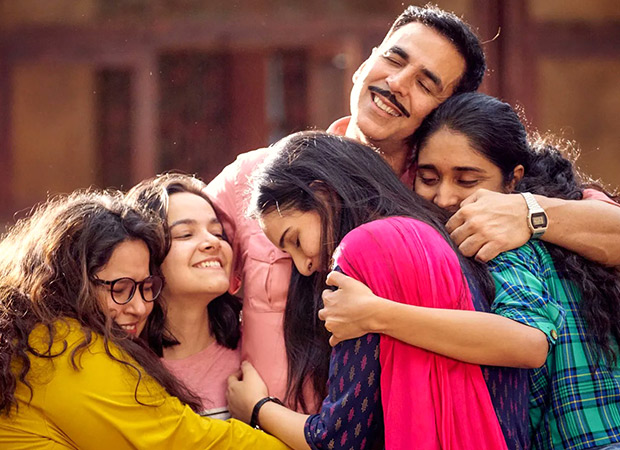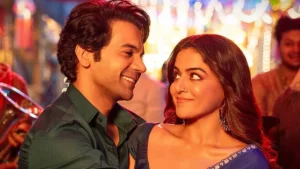
Aanand L. Rai’s latest film is titled Raksha Bandhan. Nobody expects a revolution from it. As I tiptoed into a cinema hall – despite having raised eyebrows at its trailer – I silently hoped the makers might tone down the quotient of regression. Alas, I was in for no luck as they conjure up a film that is easily the worst I watched since Roohi (which incidentally contained nothing offensive) in 2021.
There are regressive Bollywood films and then there are those that eulogize family setups like the one in Raksha Bandhan. Lala Kedarnath (an aged Akshay Kumar with a sticker mustache) is the elder male sibling and, hence, the provider to his sisters. Each sister has a defining characteristic. The eldest one is an angelic beauty with a halo over her head. The others are overweight, dusky, and androgynous (mockingly referred to as a double-decker bus, amavas ki raat, and Chhota Shakeel respectively). None of the girls seem to have had notable education or worthwhile ambitions. All of them look forward to being married off as their brother struggles to amass dowry for each. Another significant leg in the film is Lala’s childhood (!!!) sweetheart Sapna (Bhumi Pednekar). Her father (Neeraj Sood) is understandably frustrated by our leading man’s bizarre promise to his deceased mother. Lala wouldn’t marry before his siblings are packed off. Sigh.
Nothing makes sense in Raksha Bandhan. I repeat. Nothing. The sisters are the most clueless bunch of women you would ever come across in a modern-day Hindi film. Their lack of personality and integrity make us seethe with anger. Known to share an amicable relationship with Sapna, the women – at no point – try convincing their brother to strap on a pair and get over the godawful ‘vachan’ (promise) that affects so many lives.
ALSO READ: ‘Atrangi Re’ review – Aanand L. Rai’s love story is twisted, not in a good way
Written by Kanika Dhillon and Himanshu Sharma, the film shockingly normalizes dowry. There is an elaborate scene staged in a public place where a sarcastic Akshay Kumar silences an activist who tries to raise awareness against it. By the time the film tries to reverse its impact, it’s too late.
Raksha Bandhan would offend any sensible person when the leading man (casually) sells his kidney for a hefty sum to marry off the girls. No, this isn’t Hera Pheri’s Raju finally acting upon his plans 22 years hence. Lala’s day job is to sit at a snack shop where he sells some sort of holy ‘gol gappas’ that would bless them with male children. Women are constantly projected as housekeepers with no dreams or careers. Rai’s film tries to undo each of its vices but with absolutely no heart. By the time the brief climactic monologue erupts, its problematic messages have already sunken deep.
Among things that Raksha Bandhan refuses to fix is its horrifying lack of compassion. It’s appalling to see a film in 2022 that uses stammer as a tool for comic relief. Not to forget, the film mindlessly shames its second leads for their weight, skin color, and sartorial choices (which would extend to sexuality in a broader sense). The hero’s ideals – after a harrowing incident (not the one where he sells a kidney) – take a somersault and he decides to invest in his sisters’ education. The women, in an utterly laughable scene, pile up UPSC texts and blurt out, “Aaj se kutton ki tarah padhai karenge” (roughly translated as “let’s study our arses off from today”). I haven’t seen worse writing (and acting) in a Hindi film in ages. The women do turn enterprising but, again, at no point do they ask their brother to get a life for himself. The man waits and waits, only so that he could do a geriatric marriage, previously seen in Bharat (which appears to be a mini-classic in comparison to this abomination of a film).
If the values on display date back to colonial times, the film’s aesthetics and technical aspects are nowhere behind. Shot entirely in a scrappy set that has been made to look like Delhi’s Chandni Chowk, the film underuses the abilities of its proficient DOP K.U. Mohanan. If Himesh Reshammiya’s songs sound awfully dated, Ishaan Chhabra’s original score puts extra soap on the soppy mess that Raksha Bandhan is.
The biggest irony in Aanand L. Rai’s film is that it never focuses on the siblings. The brother’s sole priority is to commoditize his sisters as if they were pieces of land waiting to be confiscated by the government. Lala’s relationship with Sapna (Bhumi Pednekar is the film’s sole ray of sunshine) is explored in depth, but it gets mundane in no time. The woman wants to get married, but the man doesn’t. There are about five confrontations staged around the same duel, resulting in gallons of tears and zero solutions. It was particularly upsetting to watch Pednekar (who starred in Dum Laga Ke Haisha and Bala) in a film that espouses a dangerous worldview.
This is no spoiler but Raksha Bandhan, too, has the mandatory Akshay Kumar sermon where he addresses (groan!) the need to eliminate dowry while explaining why women should have identities. Everything feels so horribly offensive that similar films from the ‘70s, such as Tapasya and Aaina, look way more honest and time-appropriate. Not only is Raksha Bandhan the worst solo-hero film in Akshay Kumar’s career, but it is also the lowest low for its filmmaker and writers who have delivered decent films in the past.
Rating: ★

